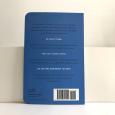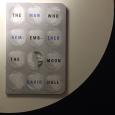Much of our identity as humans is based on the understandings we share about the world, a kind of collective consciousness we have. So what would happen if you suddenly found that something pivotal to everyday life was missing, something embedded in human culture, and that you were the only one who remembered it? That’s the premise behind an intriguing story from David Hull entitled “The Man who Remembered the Moon”, published by Dumagrad Books.
Our narrator/protagonist is one Daniel Hale, a young man who happens to notice, while sitting on a fire escape with his girlfriend one night, that the moon is no longer floating in the sky. His girlfriend is uncomprehending when he comments on this; the newspapers have mysteriously omitted to put the phases of the moon in their astronomical section; and all references to things lunar have disappeared from works of literature and poetry. Surrounded by uncomprehending family and friends, it’s not long before Daniel is admitted to a psychiatric unit where he encounters the unconventional and skeptical Dr. Marvin Pallister. The doctor is determined that Daniel will be cured – but does Daniel really have the condition which has been named Hale-Pallister’s Lunacy, or is it the rest of the world that’s gone mad?
The passage of time is nowhere more painless than in the study, which is why scholarship is dangerous. Pain is our best defence against harm ad when we are etherized by an obsession we are at our most vulnerable. Time can tear chunks from your life, feast on your living flesh while you’re numbed by dreams of reason.
I was really pleased to be offered a proof of this story by the author, as I liked the sound of Dumagrad Books (their byline is “Publishing the books Marco Polo brought back from invisible cities” and their name means “word city”.) It’s an engrossing, fascinating tale, and is the kind of speculative storytelling I love. From the very start, you’re drawn straight into Daniel’s story, becoming complicit with him (because of course, we know the moon is there – don’t we?). We struggle alongside him to comprehend exactly what’s happened and to make sense of the paradigm shift that seems to have taken place in the world – who is mad and who is sane? Who is actually telling the story and who can we believe? It’s a tale that throws up a great number of questions and leaves you thinking about it for a long time afterwards.
It’s a long time since I’ve enjoyed a new piece of writing so much – I only wish there was more of it! Although only 54 pages long, it packs in a heck of a story, with hints of Calvino (who was also of course inspired by Marco Polo’s invisible cities). If you like speculative fiction, short stories or just an intriguing piece of writing, I’d definitely recommend “The Man Who Remembered The Moon” and I look forward to reading more of Hull’s work in future.






